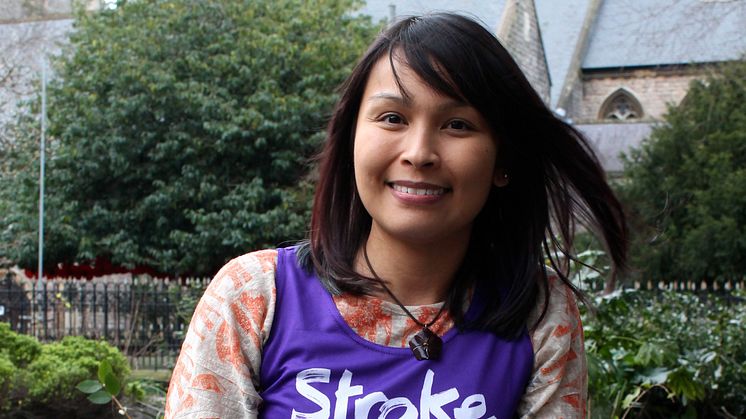
News -
Young stroke scientist takes on marathon after overcoming rare brain disease
Claris Diaz, 32, originally from California, now lives in Cardiff and has devoted her life to stroke research after her childhood was affected by stroke.
From the age of 10 Claris began to have frequent Transient Ischemic Attacks (TIAs also known as mini strokes). The symptoms of TIA can pass very quickly but are similar to stroke symptoms.
Claris explained “Many of my TIAs happened while I was at school and I would experience weakness down the right side of my body or even a complete loss of function. Sometimes I would lose my speech and occasionally I would urinate myself.
“It occurred almost every single time that I went to my band practice class where I was learning how to play the flute. If it wasn’t during band practice, it would happen whenever I would laugh extensively or took part in any physical activity that raised my breathing rate.
“I didn’t go to the hospital because I wasn’t sure what was happening and I would hide my symptoms from my friends. My parents eventually became aware of the attacks and I went to see a doctor who referred me for scans. I had my first scan when I was in my second year of high school.”
Claris’ TIAs were caused by a rare condition called Moyamoya syndrome. The condition leads to irreversible blockage of the main blood vessels to the brain as they enter into the skull. New blood vessels develop around the blocked vessels to compensate for the blockage, but these vessels are small, weak, and prone to bleeding and blocking. “Moyamoya” means puff of smoke in Japanese, which is how these new vessels appear on brain scans.
Claris explained; “It wasn't until I was 26 that I was preliminary diagnosed with Moyamoya disease. I had so many questions as it is such a rare condition. “
Following her diagnosis Claris had to travel to Berlin to undergo two brain surgeries, one on each side that meant the arteries for her facial blood supply were rerouted to supply her brain instead. Her operations were a success but the recovery periods took a toll on Claris.
“It was a difficult time for me both physically and emotionally. I was 26 years old and my whole life changed in a matter of months. My studies had to be put on hold so I could have my treatments but I managed to return over half a year later to finish my dissertation.”
Due to the disease and the treatments involved Claris now has epilepsy and occasionally still experiences TIAs. After five years her seizures are now under control with medications. Another surprising after-effect is Claris experiences a loss of sensation on her right side if she leans her to the left for a long period of time. Occasionally her tongue can feel numb and her speech can become slurred.
Incredibly Claris has completed her Masters of Research degree with Distinction and went on to be awarded a Wellcome Trust four year PhD in Neuroscience, devoting four years of her life to stroke research.
“I’m so proud of what I’ve accomplished. As well as my academic achievements I’ve also worked hard at building up my physical strength. After my surgeries I couldn’t go for a walk without feeling ill and would have to sleep for the rest of the day. Even when I started my PhD, two years later, I had to take a nap as soon as I got home.”
It took Claris some time before she was used to working full-time again but she will be completing her thesis soon. In 2011 she completed the Bath Half Marathon and has signed herself for her next challenge which will be taking on the Berlin Half Marathon for the Stroke Association.
She explained: “I can’t emphasise this enough: your life isn't over, you may feel like it is when recovery seems impossible but you have to set yourself goals. I gave myself a to-do list to have something to look forward to.
“My recovery was tough. I couldn’t do anything by myself to begin with. I kept focussing on what I did have control over, even if at the start it was just my mind-set and keeping myself positive. The wish list idea was important to me. There were places I wanted to visit, maybe run a race or volunteer.
“The emotional side of things is so important, more than people realise. When I’d recovered physically you couldn’t tell what I’d been through which makes it hard for people to understand that my emotional recovery is still happening. Moyamoya is so rare it’s been a challenge to find people to talk to that know what I’ve experienced.
“It is still difficult for me emotionally, but on the outside, I was able to put my life back on a path. I don't know where I will end up in the future, but at least I know I have the present.”
Claris has already raised over £2,000 and is now aiming to raise at least £3,000 by the time she goes to Berlin at the end of March. You can support her and read her story on her Justgiving page.










